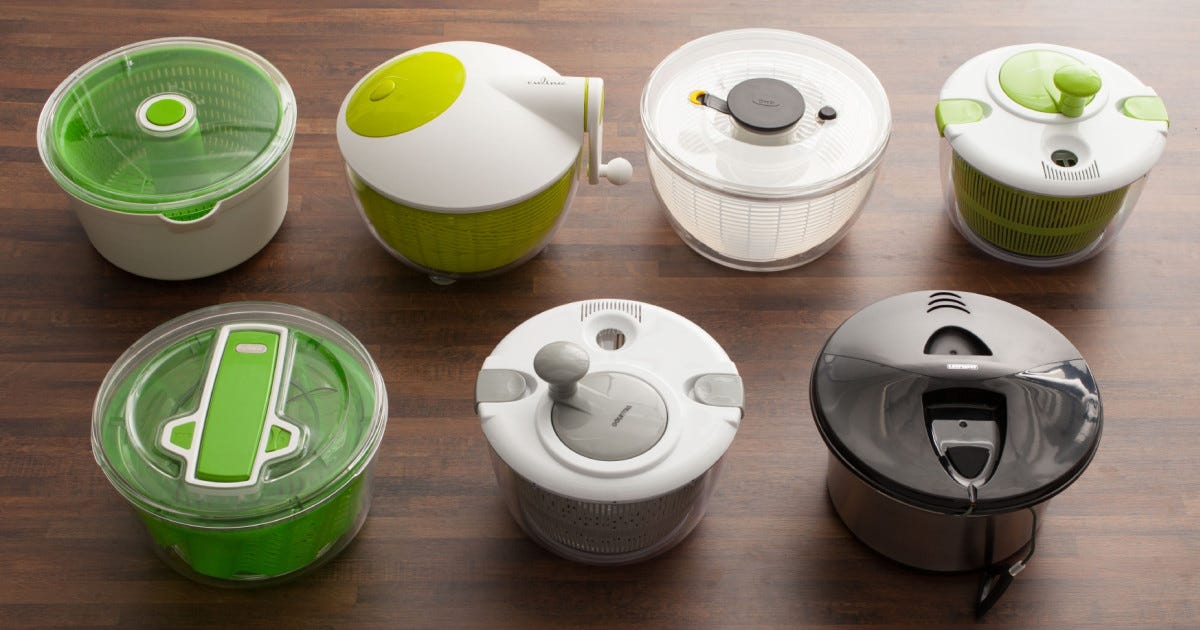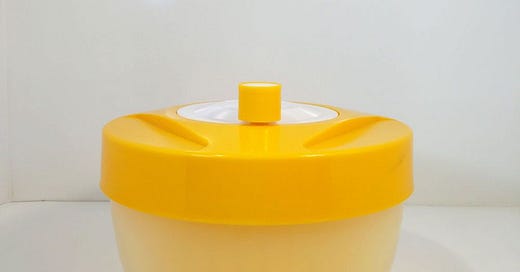The first salad spinner I ever used was goldenrod yellow, and its color and air of kitchen efficiency made the spinner very much a product of its time. It became my favorite tool in the kitchen growing up: Spinning greens dry was both a fun and tactile experience and a part of bonding with my mom and I cooked alongside her.
The salad spinner was patented in 1971, though similar devices exist back into the 19th century, and when it hit the American market, it saw near-overnight success. My mom, moving out to Colorado in the 1970s, almost certainly got the spinner then: A dedicated object for a dedicated task, cementing her identity as someone who cooks, and who cooks enough to need specialty appliances to do it.
I am undoubtedly younger than the goldenrod spinner: I was born in the early 80s, and it features in my earliest kitchen memories. I imagine having an appliance that doubled as a toy was a huge help to mom when her nosey toddler wanted to ‘help’ with dinner.
Most articles online talk about salad spinners as purely nostalgic objects: tucked away in a cabinet and largely forgotten, but never gotten rid of. In a way, the salad spinner seemed to serve as the novelty kitchen appliance of the late 1970s and early 1980s: it had its heyday, and while still available today, I’ve not seen one in action in a home kitchen for probably fifteen years.
But, unlike other trendy products, people seem to want to keep their spinners. I regularly see George Foreman grills on thrift store shelves: I’ve almost never seen a second hand spinner in a store. A Google search for salad spinners seems to confirm my suspicions, as blog posts and articles wax poetic about salad spinners collecting dust in their cabinets, but never discarded:
As I child I would occasionally use my mother's salad spinner as a UFO/time machine. I would place some of my miniature action figures inside, pull the cord and listen to the clatter as my 'men' were ostensibly transported to another universe. That my mother allowed me to use her salad spinner as a toy speaks to its level of usefulness in our household. My mother rarely used it, except when preparing large salads. Most of the time it sat in a pantry cupboard - unused and unloved.
This was not the case in our household: Salads, and thus the spinner, were a staple, and my task of turning the crank and giggling as the greens sprayed water against the sides of the bowl was a near-nightly ritual. Childhood was a space that sometimes felt uncertain, and did not always have those unbridled joyous moments: The salad spinner for me, then, was a symbol not only of nourishment but of security.
But why does everyone else have their salad spinners, many decades old, still clattering around in cupboards? Are they seeking a lost sense of security, too?
I’ve wondered if it’s because a ‘healthy’ product makes us feel healthier: Like having a set of kettlebells that you rarely pick up, but are comforted by the fact that you *could*.
Or is it a trick of marketing? Having that one more appliance that, as the ads always tell us, will finally make our kitchen complete and our meal prep a breeze?
However, it seems that for most people sentimentality is indeed the key: I’m not the only one, it seems, who’s mapped important memories onto a plastic colander nested in a bowl.
When I moved away to college, the goldenrod spinner stayed with mom, and years of spartan living arrangements meant I lacked the kitchen real estate to have one of my own. But I always pined for one. Was it a pang of nostalgia? While the spinner was a part of her identity as a budding home cook, my attachment had more to do with feeling fed in a meaningful sense: I hadn’t experienced a salad spinner-inclusive meal without other food on the table and family to eat with. Perhaps, living alone and food insecure in a small apartment, the spinner came to symbolize balanced meals and love: The things I needed to make my own kitchen complete.
At 24, I briefly married, and my maid of honor bought me a shiny new white salad spinner. I was elated, even after she confessed that she chose it so I would stop talking about salad spinners. The spinner became an important part of my kitchen rituals, particularly in spring and summer when big batches of greens from the garden needed washing. When my then-husband and I divorced, we remained friends, and the spinner remained with me.
Years later, I was sorting through my kitchen cupboards as I packed to move cross-country for my PhD. I pulled my beloved spinner from the cupboard, setting it on the counter. Not seeing it later I assumed that someone else had boxed it up, along with all the other kitchenwares.
When I unpacked, I made a terrible realization: The spinner had disappeared. My then-partner had, apparently, not had the same attachment to it as me, and added it to our donation pile prior to the move. As consolation, my mom offered to send me her old salad spinner, THE spinner! What luck! But she forgot, and as the years wore on, I forgot too.
Resigned to a life of unspun salads, my interest re-emerged a year before her death, when she mentioned the spinner again. She said she still planned to send it to me, but she became ill soon after, later passing.
When I think about the goldenrod spinner now that she’s gone, the nostalgia of it is different: I’ve built a whole life filled with food and love, and so no longer feel an ache for objects and memories that offer those.
But the nostalgia I do feel now is for my mom as we work alongside each other in the kitchen: At every stage of my life but this one, we’ve prepared meals together, our hands moving on adjoining cutting boards or in the sink to wash greens and cut vegetables. Losing access to her salad spinner when she died was the loss of a very specific kitchen memory: One completely detached from the drama that often accompanies co-prepared meals. The salad spinner was a symbol of our shared culinary joy.
The salad spinner is an affirmation that even the simplest kitchen gadgets can bring us the most happiness, and that our personal culinary histories are just that: My fondness for salads as an adult has a lot to do with the joy a spinner infused into childhood meal prep.
David Tamarkin argues that sentimentality has no place in a salad (or a non-working spinner), but if I still had that goldenrod yellow spinner, it would live in my kitchen forever.

Related to salad, and dressings from the era of spinners: If you haven’t yet, I highly recommend signing up for Emily Nunn’s Department of Salad newsletter.
Informative and fun, and it reignited my love of those raspberry vinaigrette-based salads from the 80s that I had all but forgotten about. We used the bottled raspberry vinaigrette on our salads growing up, but I can attest that Emily’s is much better.
Not related to salad: I’m excited to announce that my next book, Culture Begins Here: Fermentation and the History of How we Eat has a publication date! Storey will be publishing it in May of 2022.
(It does talk a good bit about vinegar so is, I suppose, tangentially related to salad).





